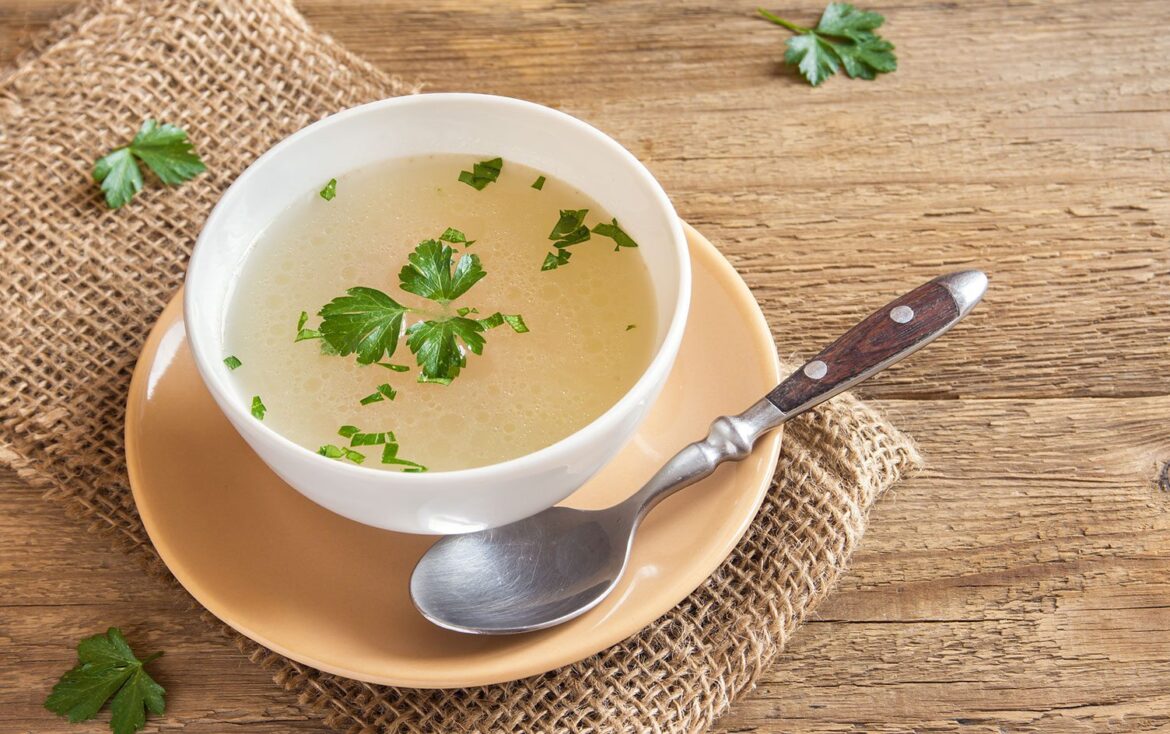Introduction
How To Make Bone Broth For Weight Loss: The ever-evolving landscape of dieting and weight management, one ancient elixir has emerged as a powerful ally in the quest for a healthier, leaner body bone broth. While bone broth has been consumed for centuries as a nourishing and comforting beverage, its recent resurgence in popularity is largely attributed to its potential to aid in weight loss. This savory elixir, derived from simmering bones, connective tissues, and various aromatic vegetables, is not only a culinary delight but also a nutritional powerhouse.
We will delve into the art and science of crafting the perfect bone broth for weight loss. We’ll explore the numerous ways in which this liquid gold can play a pivotal role in your wellness journey, from boosting metabolism to curbing cravings and promoting a sense of fullness. Weight management has always been a topic of great interest, with numerous diets and trends emerging over the years. Yet, amidst the fads and quick fixes, bone broth stands as a time-honored tradition that has withstood the test of time. As we unravel the secrets behind its weight loss benefits, you’ll discover that the true magic of bone broth lies in its rich nutritional profile.
At its core, bone broth is a potent source of collagen, gelatin, and an array of essential amino acids that can fortify your body in ways you might not have imagined. Additionally, it contains a wealth of vitamins and minerals, such as calcium, magnesium, and phosphorus, which are integral to overall health. These components work together synergistically to promote satiety, reduce inflammation, support healthy digestion, and enhance the body’s fat-burning capabilities.

Does bone broth really make you lose weight?
Bone broth may also help people lose weight. It is high in protein, which helps the body feel fuller for longer and supports calorie restriction. A 2017 study in the Journal of Renal Nutrition points out that the average cup of chicken bone broth contains more protein than the average cup of basic chicken broth.
Low in Calories
One argument in favor of bone broth for weight loss is its low-calorie content. When consumed in place of high-calorie snacks or meals, bone broth may contribute to a calorie deficit, which is essential for weight loss. However, it’s crucial to remember that weight loss depends on the overall balance between calories consumed and calories expended throughout the day.
Appetite Suppression
Some proponents claim that bone broth can help curb appetite due to its protein content. Protein is known to promote feelings of fullness and reduce the consumption of additional calories. However, research on bone broth’s specific appetite-suppressing properties is limited, and it may not be a magic solution for everyone.
Collagen for Metabolism
Collagen is a prominent component of bone broth and has gained attention for its potential role in boosting metabolism. Collagen supplements are sometimes marketed for this purpose. Still, there isn’t enough scientific evidence to conclusively support the notion that collagen alone can significantly influence metabolic rate or lead to substantial weight loss.
Nutrient Density
Bone broth is indeed nutrient-dense, containing essential vitamins and minerals such as calcium, magnesium, phosphorus, and various amino acids. While these nutrients are essential for overall health, their direct impact on weight loss may be limited. Weight management is a complex process influenced by multiple factors, including genetics, activity levels, and dietary habits.
How much bone broth should I drink daily to lose weight?
There’s really no such thing as too much bone broth, but you can tailor your bone broth consumption for your specific health goals. For muscle gain and weight loss drink 2-6 cups daily. For gut health, try at least 2 cups of bone broth each day.
Calorie Consideration
Bone broth is relatively low in calories, making it a popular choice for those aiming to lose weight. A typical serving of bone broth contains approximately 30-50 calories, depending on the preparation. Incorporating bone broth into your daily diet in place of higher-calorie snacks or beverages can help create a calorie deficit, a fundamental aspect of weight loss.
Satiety and Meal Replacement
One approach to using bone broth for weight loss is to consume it before meals to promote a feeling of fullness, potentially leading to reduced overall food intake during the meal. This satiety effect can help control portion sizes and contribute to weight loss efforts. Some individuals use bone broth as a meal replacement, particularly during intermittent fasting or as a part of a low-calorie diet.
Individual Goals and Body Composition
The optimal amount of bone broth for weight loss can vary from person to person based on individual weight loss goals, body composition, activity levels, and overall dietary plan. Some may find success with one cup of bone broth daily, while others may include it in multiple meals throughout the day.
Consultation with a Professional
To determine the appropriate amount of bone broth for weight loss, it is advisable to consult with a registered dietitian or healthcare professional. They can assess your specific circumstances, health status, dietary needs, and weight loss goals to provide personalized recommendations regarding the quantity of bone broth that aligns with your weight loss strategy.
How do I use bone broth to lose weight?
The Bone Broth Diet is a 21-day diet plan that combines 5 days of a low-carb, paleo diet with 2 days of bone broth fasting per week. Though some studies suggest that these dietary approaches may help you lose weight, it’s uncertain whether they’re better than standard reduced-calorie diets.
Incorporate Bone Broth into Your Diet
The most straightforward way to use bone broth for weight loss is to incorporate it into your daily diet. You can consume it as a warm, comforting beverage or use it as a base for soups, stews, and various recipes. Replacing high-calorie snacks or calorie-laden beverages with a cup of bone broth can help reduce overall calorie intake while providing essential nutrients.
Use Bone Broth as a Pre-Meal Appetite Suppressant
Drinking a cup of bone broth about 20-30 minutes before a meal can help curb your appetite and promote a feeling of fullness. The protein content in bone broth may help you eat smaller portions during your main meal, which can contribute to weight loss by reducing overall calorie consumption.
Incorporate Bone Broth into Fasting or Intermittent Fasting
Bone broth can be particularly useful for individuals following fasting or intermittent fasting protocols. During fasting periods, a cup of bone broth provides essential nutrients and can help stave off hunger pangs without breaking your fast. This can make fasting more manageable and potentially enhance its effectiveness for weight loss.
Replace High-Calorie Sauces and Gravies
When cooking, consider using bone broth as a base for sauces, gravies, and marinades instead of calorie-dense options like cream or butter. This substitution can reduce the calorie content of your meals while adding flavor and nutrition.
How to do 3 day bone broth diet?
Drink between 3-4 litres of bone broth a day, for 3 consecutive days. This can be broken up into 5 intervals – 7 am, 10 am, 1 pm, 4 pm and 7 pm. You may also consume green and herbal teas, coffee and even a cup of espresso!
Start with a Morning Cup: Begin each day with a warm cup of bone broth. This can help kickstart your metabolism and provide essential nutrients.
Regular Intake of Bone Broth: Aim to consume 2-3 cups of bone broth throughout the day, spacing them out as needed to help control hunger. You can season your broth with herbs and spices for flavor.
Include Light Meals: While bone broth is the main focus, it’s essential to incorporate small, balanced meals into your plan. Opt for lean proteins, vegetables, and healthy fats. Examples include grilled chicken with steamed broccoli or a salad with olive oil dressing.
Stay Hydrated: In addition to bone broth, drink plenty of water to stay hydrated. Herbal teas without added sugars are also a good choice.
Avoid Sugary and Processed Foods: During these three days, eliminate sugary foods, processed snacks, and high-calorie beverages from your diet. This will help reduce overall calorie intake and promote weight loss.
Is it OK to drink bone broth every day?
“The use of bone broth daily has been shown to decrease appetite due to the high protein content, thus many have noticed weight loss as a side effect,” Litt says. However, for this reason, bone broth should not be used daily by children and pregnant women, she adds.
Nutrient Density: Bone broth is rich in essential nutrients, including collagen, amino acids, vitamins, and minerals. Consuming it regularly can contribute to your daily nutrient intake, especially if it’s made from high-quality ingredients.
Joint Health: Collagen, a prominent component of bone broth, may support joint health by promoting the strength and elasticity of cartilage. Regular consumption could potentially alleviate joint pain and discomfort for some individuals.
Digestive Health: The amino acids in bone broth, such as glutamine and glycine, are believed to support digestive health. They can help strengthen the intestinal lining and may aid in reducing digestive discomfort.
Hydration: Bone broth is primarily water, making it a hydrating option that can help maintain overall hydration levels.
Warm and Comforting: Many people find comfort in sipping on warm bone broth, which can be especially soothing during cold weather or when you’re feeling under the weather.
What is the best time to drink bone broth?
first thing in the morning
Ingesting a good quality bone broth before and after exercise can not only enhance performance, but also speed up the recovery process. Taking bone broth at least one hour before exercise (which most of us do first thing in the morning) is optimal for bodily digestion and energy.
In the Morning: A Nutrient Boost to Start the Day
Drinking bone broth in the morning can be an excellent way to kickstart your day with a dose of essential nutrients. The warm, savory broth can be a comforting alternative to coffee or tea and may help hydrate your body after a night’s rest. The collagen and amino acids in bone broth can promote skin health and support joint function, making it a great addition to your morning routine.
As a Snack: An Appetite Suppressant
Bone broth can be an effective snack option, especially if you’re trying to manage your weight. Consuming a cup of bone broth between meals can help curb your appetite, thanks to its protein content. This can prevent overeating during your next meal while providing your body with a nutrient-rich boost.
Before a Meal: Support for Digestion
Enjoying a cup of bone broth 20-30 minutes before a meal can support digestion. The amino acids in bone broth, such as glycine and glutamine, may help strengthen the intestinal lining and promote better digestion. This pre-meal ritual can also encourage mindful eating and portion control.
After Exercise: Replenish Nutrients
If you engage in physical activity, consider consuming bone broth post-workout. It’s an excellent choice for replenishing lost fluids, electrolytes, and essential nutrients. The protein content can also aid in muscle recovery.
What is the 10 day bone broth diet?
The 10-Day Belly Slimdown Diet Plan focuses on nutrient-dense foods to promote health and induce fat-burning. It prioritizes proteins, such as lean meats and collagen-rich bone broth, and carbohydrates, like whole grains and legumes. Plenty of veggies, including green beans, should form the bulk of your meals.
Emphasis on Bone Broth:The fundamental principle of the 10-day bone broth diet is the consumption of bone broth as a central element of every meal throughout the ten-day period. Bone broth is typically made by simmering animal bones (such as beef, chicken, or fish) with vegetables, herbs, and spices to extract the nutrients and flavors.
Short-Term Fasting:The diet often involves short-term fasting, particularly during the initial days. Fasting can help kickstart the body’s metabolism and encourage the utilization of stored fat for energy, potentially leading to weight loss.
Limited Food Intake:Apart from bone broth, the diet restricts the intake of other foods. Solid food consumption is generally minimized, especially in the first few days, to amplify the effects of fasting and encourage a detoxifying process.
Hydration:Adequate hydration is encouraged during the 10-day bone broth diet. Water, herbal teas, and other non-caloric beverages are typically allowed to keep the body hydrated throughout the fasting period.
How do you start drinking bone broth?
How should you consume it? Begin the day by drinking 8-12 ounces of warm bone broth. Consume a lunch meal that contains bone broth (like beef vegetable soup), and then sip a post-dinner cup of bone broth to end your day.
Choose High-Quality Bone Broth
The first step in starting to drink bone broth is selecting a high-quality product. You can either make your own bone broth at home or purchase it from a reputable source. When purchasing store-bought bone broth, read labels to ensure it contains minimal additives and preservatives.
Familiarize Yourself with Bone Broth Varieties
Bone broth can be made from a variety of animal bones, including chicken, beef, pork, and fish. Each type of bone broth has its unique flavor profile and nutrient composition. Experiment with different varieties to find your preference.
Start Slowly
If you’re new to bone broth, it’s a good idea to start slowly. Introduce it into your diet by consuming a small cup or bowl as a beverage or soup. This allows your palate to adjust to the taste and your digestive system to adapt.
Sip It Solo
Begin by sipping bone broth on its own, like a warm cup of tea. Enjoying it solo allows you to appreciate its natural flavor and warmth. Over time, you can experiment with adding herbs, spices, or even a squeeze of lemon to enhance the taste.

Conclusion
One of the most significant advantages of bone broth is its rich nutrient profile, which includes collagen, gelatin, essential amino acids, vitamins, and minerals. These components work in harmony to promote satiety, improve digestion, reduce inflammation, and enhance metabolism. As a result, bone broth can help you stay fuller for longer, reduce unhealthy snacking, and create an environment in your body that is conducive to burning fat. Making bone broth at home allows you to control the quality of ingredients and customize the flavor to your liking.
This versatility ensures that bone broth can be seamlessly integrated into various recipes, from soups and stews to sauces and smoothies, making it a practical and enjoyable addition to your diet. However, it’s essential to that while bone broth can be a valuable tool for weight loss, it should be part of a holistic approach to health that includes a balanced diet and regular physical activity. There is no one-size-fits-all solution to weight management, and individual factors such as genetics, lifestyle, and overall diet play crucial roles in your success.
Bone broth offers a delicious and nutritious way to support your weight loss journey. Its rich nutrient content, versatility in cooking, and potential to improve overall well-being make it a valuable to your dietary repertoire. So, embrace the tradition, savor the flavor, and enjoy the nourishing benefits of homemade bone broth on your path to a healthier, leaner you.

